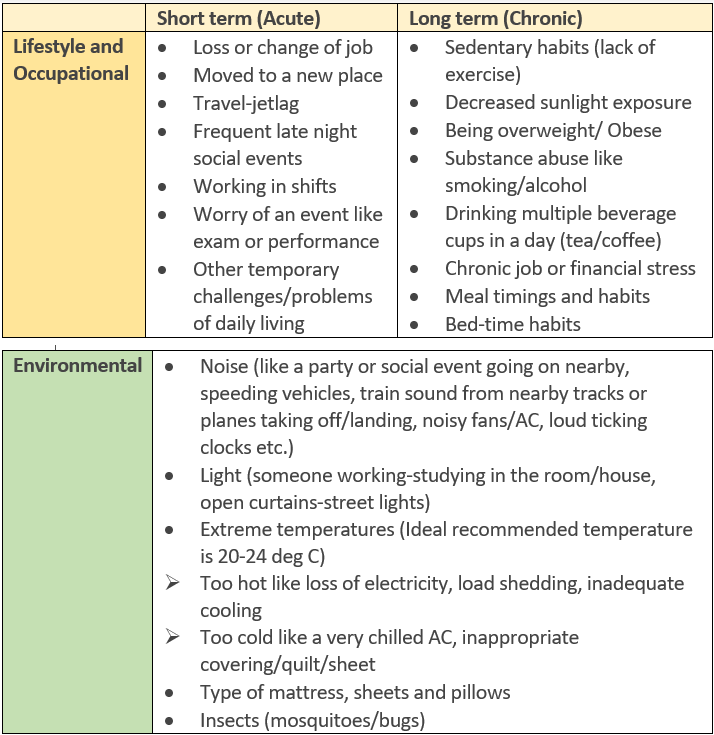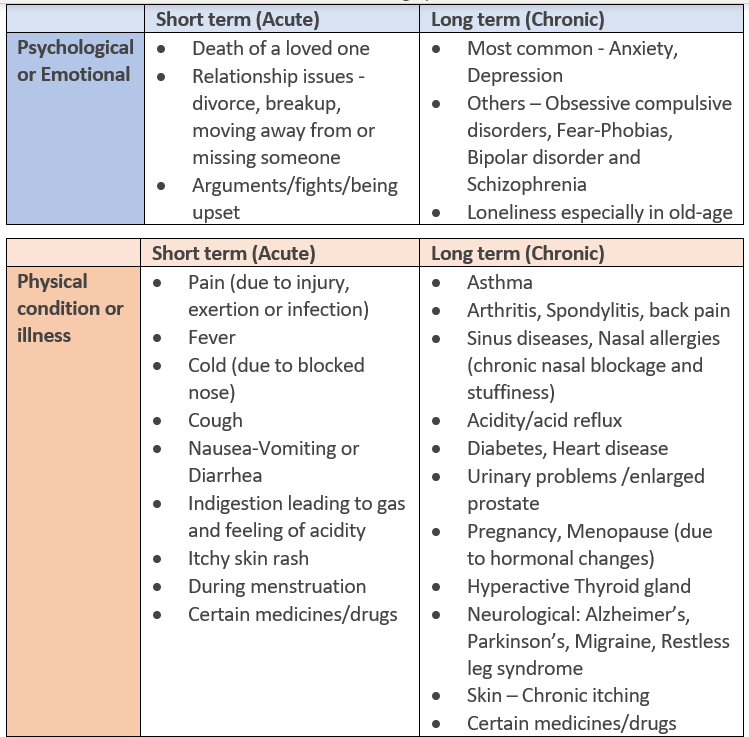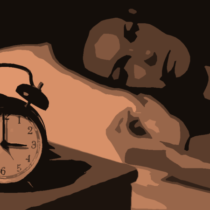UNDERSTANDING AND DEFINING INSOMNIA
‘Somnus’ means sleep in Latin, therefore Insomnia refers to an inability to sleep.
Every adult needs around 8 hours of uninterrupted sleep for optimal health, wellness, and functioning. In children, a longer duration of sleep is required (around 10 hours in children <13 years and 12 hours in children <3 years).
However medically when we use the term Insomnia, it includes any of the symptoms below:
- Difficulty falling asleep
- Waking up during the night and having trouble going back to sleep
- Waking up early in the morning before completing the required duration and quality of sleep
- Feeling tired upon waking which can further lead to
- Sleepiness and tiredness during the day
- Irritability
- Decreased concentration, performance or memory
Short-term (acute) insomnia or episodes of inability to sleep, generally last for a few days to a few weeks (< 1 month) and settle down once the body clock adjusts with the passage of time.
Chronic Insomnia (long-term inability to sleep or sleep deprivation) is the term used when present for at least one month or longer. Some international guidelines define chronic insomnia as being present for 3 or more months and at least for 3 nights a week.
HEALTH IMPACT OF INSOMNIA
Inadequate sleep can lead to sleepiness and tiredness during the day, irritability, decreased concentration, performance and memory. Decreased duration and quality of sleep have been seen to be associated with increased long-term risk of health issues like diabetes, increased blood pressure, heart disease, and anxiety-depression. It also leads to the formation of dark circles under the eyes.
Adequate sleep suppresses the hunger hormone ‘ghrelin’ and increases the satiety hormone ‘leptin’ which prevents binge eating. Therefore, lack of good sleep is associated with weight gain and obesity which in turn reduces the quality of sleep.
CAUSES OF INSOMNIA






HEALTH SOLUTIONS
Below are health measures for managing chronic insomnia and improving sleep
Bed Time and Sleep Habits
- Regularize sleep timings: Fixing or regularizing the time one goes to sleep and gets up, should be a goal on most days. This goes a long way in preventing Insomnia.
- Avoid day-time naps: Taking naps in the day is not recommended as it can delay or prevent falling asleep at the regular bedtime at night. But if an afternoon nap is part of your lifestyle and helps you perform better towards the evening, then regularize its timing and keep duration under 1 hour, and timing before 5 pm.
- Reduce and restrict strong and direct artificial light exposure between dusk and bedtime: This is seen with TV, mobile phones, kindles, IPads and laptops, which can suppress the release of the sleep-promoting hormone melatonin (the blue light from gadgets is largely responsible – so switch on blue light filter on display settings after dusk). Decreased melatonin enhances alertness and shifts the body rhythms to a later hour, making it more difficult to fall asleep.
- Avoid keeping the mobile phone or a watch/clock right next to your bed. Keep it on a table at least a little more than an arm’s length away.
- Cultivating alternate bedtime habits like reading or listening to music, instead of surfing on visual gadgets can be indeed helpful for those with chronic sleeplessness.
- Making a next-day plan (breaking up intimidating tasks, delegating and prioritizing), preparing a to-do list/ list for the next day, or writing a day’s diary at bedtime can help lower stress, anxiety and head cluttering which can help to fall asleep better. However, do not review finances, bills or work-related/domestic problems at bedtime.
- A bedtime bath in warm water (not cold or hot), can help in falling asleep.
- Relaxation techniques: A simple bedtime lying routine consisting of focusing successively on each section of the body and consciously relaxing each part, followed by focusing on your breath (inhaling and exhaling) and visualizations of positive, serene, pleasing scenes/ visuals, helps to fall asleep
- Never force yourself to sleep: If you are not falling asleep 15-20 minutes after laying in bed, it is better to get up, do some light reading, hear music, or make a to-do list till you feel drowsy (use dim light like a bedside lamp– avoid putting on a bright light).
Bedroom Environment
- Bed comfort: Check for the comfort of your mattress, pillow, sheets, and quilts
- Temperature: The room should not be too hot or cold so check fan speed regulators and AC temperatures
- Noise: Avoid noisily ticking clocks, noisy fans/AC in the room, or use earplugs.
- Light: If the room is not dark enough due to reasons beyond your control, use an eye mask.
- Pests: Get regular pest control done and keep a check for mosquitoes, bed bugs and flies- Insecticide-treated mosquito nets are available. Avoid burning coils in the room.
Dietary Habits
- Avoid consumption of ‘stimulant’ substances after 5 pm like coffee (caffeine), tea, chocolates, high sugar drinks, and nicotine (smoking/chewing tobacco) as these prevent you from falling asleep.
- Alcohol: Though that occasional glass of wine or alcoholic drink relaxes you and gives you good sleep, chronic consumption of alcohol can actually interfere with sleep quality and cause more waking in the night (disturbed sleep). It is best for people suffering from chronic insomnia to try and give up on alcohol, however, if for social reasons, you do want to continue having alcohol, then –
- Restrict alcohol to not more than one glass in a day and not more than once or twice a week
- Avoid neat drinks or gulping drinks
- Do not drink empty stomach
- Give a gap of 2-3 hours between drink and bed-time
- Dinner: As dinner is the last main or heavy meal of the day, a gap of 2 hours is recommended between dinner and bedtime. Avoid going to bed on a heavy stomach.
- Bed-time hunger: If feeling hungry at bedtime, a light snack (max: 200 calories) helps you go to sleep, as being hungry also prevents falling asleep. Some light snack options include fruits (apples, banana, kiwis, strawberries, cherries or dried cranberries), yogurt, cereal in warm milk, vegetables or a single cheese slice with a slice of brown bread, boiled egg, whole grain cracker, nuts (almonds, pistachios, or walnuts), herbal/green tea or a protein drink. Warm chamomile tea can be a soothing drink for sleep.
- Water intake: Drink 1.5-2 liters of water a day. Have a glass of water just before bedtime and a sip just before sleeping, to avoid waking from sleep due to thirst. However, do not take too much water or fluids at bedtime as it may cause you to wake up to pass urine. Urinate once just before getting into bed.
Exercise habits
- Exercise for at least 5 days in a week for half an hour to 45 minutes/day. Exercise can be brisk walking, jogging, cardio/treadmill, cycling, yoga, swimming, or aerobics.
- Keep a gap of minimum 3-4 hours between the end of your daily exercise schedule and your bedtime.
- At least 2 hours of sunlight exposure during the daytime helps the circadian rhythm better to enhance falling asleep at night.
Medical evaluation and management
For short term (acute) insomnia:
- Lifestyle and environmental modifications as suggested above, and when present, treatment, and management of the underlying acute physical illness, are adequate solutions to restore good sleep.
- Specific medicines for insomnia (sleep-inducing drugs/pills) are usually avoided though sometimes a short-acting pill may be prescribed for a few days to help cope with or overcome sudden situational changes.
- Medicines for other conditions like cold and itching have sedating properties also, which may be prescribed to help treat both the underlying medical condition as well as give sleep.
For long term (chronic) insomnia
- Detailed and thorough medical, psychological, environmental and lifestyle evaluation should be done, followed by treatment at all these levels.
- Symptoms on lying down like heartburn (acidic feeling in the chest), gas/bloating/nausea, nasal stuffiness, pain in any part of the body, general body itching, breathlessness, palpitation, cough, headache, restlessness (restless leg syndrome: abnormal leg sensations causing repeated movement and lack of sleep), or desire to frequently pass urine, all suggest a physical disorder requiring specific treatment.
- A psychological evaluation to assess the presence of significant stress, anxiety (typically prevents falling asleep), depression (causes early morning waking before adequate sleep completion) or other mental disorders, should also be done, and if present treated appropriately with counseling, psychotherapy and when needed medicines. Stress management plays an important role in improving sleep.
- In addition to medicines prescribed for underlying medical or psychological disorders like anxiety-depression, specific medicines (sleep-inducing pills) or supplements (like melatonin) to improve sleep may also be prescribed. It is important to note that medicines for inducing sleep should not be taken without medical recommendation, prescription and monitoring as inappropriate or over-the-counter usage may lead to side effects and may end up disturbing sleep more than aiding it.
- Medicines being taken for physical disorders like some cold medicines containing caffeine or decongestants, steroids, certain anti-depressants, anticonvulsants, drugs for weight loss or suppressing appetite, drugs treating attention deficit disorders, certain medicines for heart disease, blood pressure, and asthma, and hormonal treatments, can also be the cause of insomnia. Switching to alternate medicines or altering the time of taking these medicines can help in restoring sleep rhythm.
Snoring and Sleep quality
Sometimes snoring of one’s partner may also cause disturbed sleep and become a cause of chronic insomnia. The person who snores, though asleep, will wake up feeling less fresh like he/she had inadequate sleep.
Further reading –
Snoring and Sleep Apnea – Causes and simple lifestyle solutions
Depression and Anxiety – Causes, Signs and Holistic Treatment
For any query, additional information or to discuss any case, write to info@drvarsha.com and be assured of a response soon
References
Overview Diagnosis and treatment of chronic insomnia. Ann Indian Acad Neurol. 2010 Apr-Jun; 13(2): 94–102


